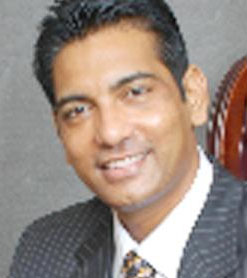The trial of Guyanese businessman Ed Ahmad, who has been indicted in New York over a US$50 million mortgage fraud, may begin sometime in November and the prosecution does not anticipate it lasting longer than a week.
A court conference held on May 21, which Ahmad’s lawyer was seeking to postpone, before Judge Dora Irizarry saw the curt setting June 1 for the defence to file its motion and the government being mandated to file a response by June 13. The defence will reply by August 3, while oral arguments are set for September 21.
According to a report of the conference seen by this newspaper, jury selection will be referred to a magistrate judge to be announced for November 5 and trial is set to commence soon after.

Last week Ahmad’s lawyer Steven R Kartagener had written to Judge Irizarry and requested an adjournment for about a month for him to “address a complicated, recently emergent issue, and perhaps file a motion with respect to that issue.
“The concomitant press of other matters makes it impossible for me to file my papers prior to that date. I consent to the exclusion of time until the next scheduled trial date.”
However, the judge did not grant the adjournment and the conference went on as scheduled. The trial was originally supposed to start this month.
Ahmad was detained last July on charges that he operated a US$50 million mortgage-fraud scheme in Queens, New York. He faces a maximum of 30 years in jail. He is currently on US$2.5 million bail.
Ahmad’s case has attracted great interest in Guyana because of his close ties to former president Bharrat Jagdeo. Ahmad had shipped a container of goods to Jagdeo at State House and many questions were asked about this.
Three alleged co-conspirators — Ahmad’s cricket friends and employees — were also indicted in an associated case last year, court records show.
The report said that Queens-based brokers Qayaam Farrouq, Mohamed Gurmohamed and Guyanese cricketer Steve Massiah were charged with defrauding banks and mortgage companies by falsifying mortgage-loan applications to make borrowers appear more creditworthy to financial institutions, court records show.
The matter against Massiah has since been dismissed without prejudice.




